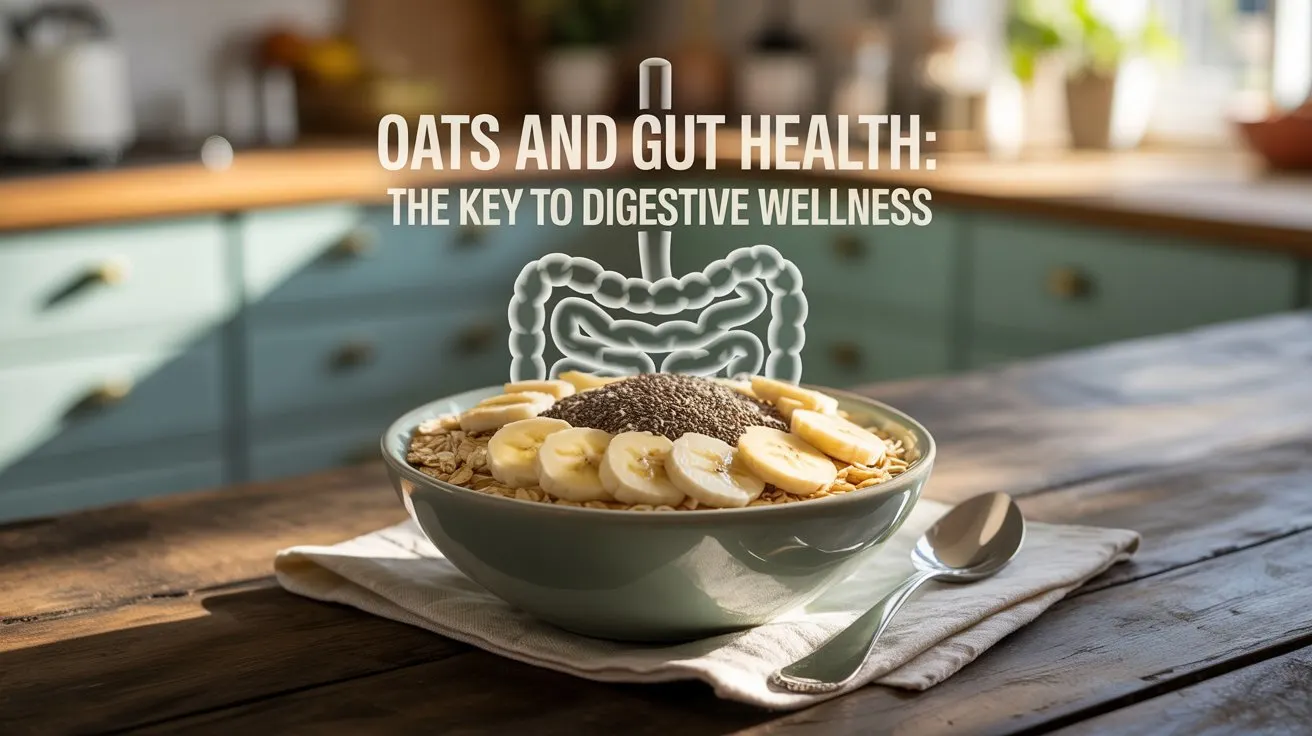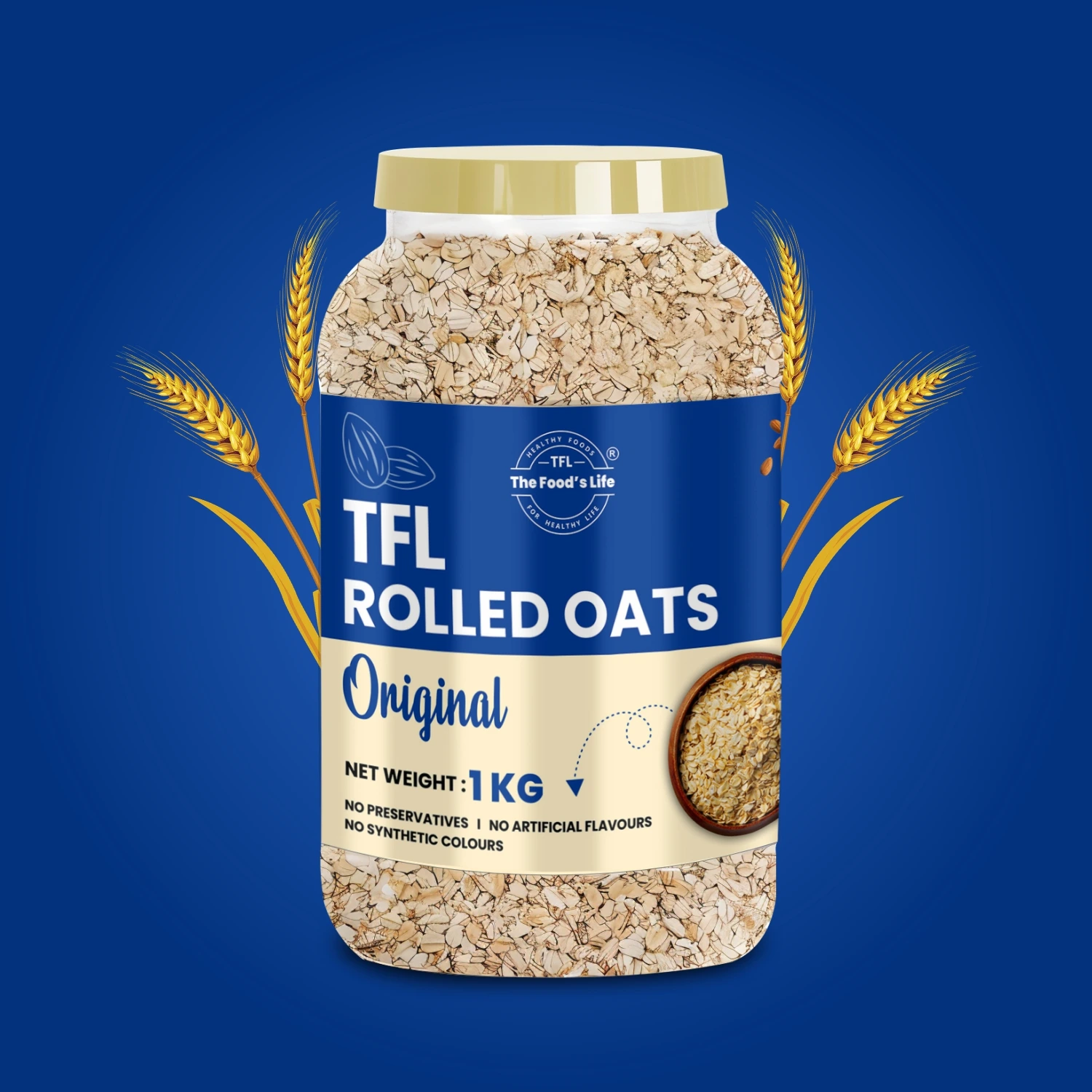Oats are a great food for keeping your gut healthy due to its fiber content. Oats are high in soluble fiber, specifically beta-glucan, which is very important for a healthy digestive system. Soluble fiber is good for digestion as it helps move things along with regular bowels and acts as a prebiotic food for helpful gut bacteria, and these aspects are some of the keys to having a healthy microbiome footprint which all contributes to overall digestive function and immunity. Taking oats regularly not only provide better gut function, but also contribute to long-term gut health. They are gentle on the stomach and can help with common digestive shortcomings such as bloating or constipation. Plus, oats have an anti-inflammatory effect which aids healing of the digestive tract, which is very important for people that have digestive sensitives or health conditions such as IBS. So, whether you are enjoying a great bowl of oatmeal, or using oats in your baking, oats are a delicious way to rigorously support your gut health.
Are Oats Good for Gut Health? The Digestive Benefits of Oats
Oats have a good potential for supporting healthy gut health. They have a high fibre content, which has soluble fibre like beta-glucan, which support gut health. Oats help to support stool frequency, improve constipation and support the regrowth of healthy bacteria, which is important for healthy digestion.
There is also some anti-inflammatory properties from oats which may reduce inflammation possible in the stomach and intestines. Therefore, oats may also help those struggling with digestion challenges, such as IBS, or aggravated stomach challenges. Oats may give your gut appropriate nutrients to support digestion on a regular basis.
The Role of Fiber in Oats for Gut Health
Oats are the fiber-dense food that is essential for digestive health, and oats contain lots of soluble fiber, called beta-glucan, which acts as a prebiotic to feed the good bacteria in your gut. Having a healthy balance of good and bad bacteria in your gut is crucial because it has very important digestive, immune, and gut health functions.
The attributes of fiber in oats are as follows:
- Regulates bowel movements: By adding bulk to stool and regulating the frequency of bowel movements, the fiber in oats can help prevent constipation.
- Enhances digestion: Soluble fiber absorbs water and expands to form a gel which enhances digestion and calms a tumultuous digestive tract.
- Serves as a food source for gut bacteria: Prebiotics feed gut microbes, and beta-glucan equally does this as the substance will be fermented in the gut.
How Oats Support a Healthy Gut Microbiome
Oats are a source of prebiotics, or food for gut health-promoting bacteria, which break down food, create nutrients, such as vitamins, and support the health of your gut. When you eat oats, the soluble fiber (beta-glucan) is fermented by the gut bacteria to produce short-chain fatty acids (SCFAs), which support the integrity of the gut lining.
Having a balanced microbiome is critical for digestion, immunity, and even mood regulation. Eating oats support the growth of healthy microbes and can help improve the diversity of your gut microbiome.
How oats help the gut microbiome:
- Promotes gut bacteria: beta-glucan feeds healthy microbes.
- Improve immune function: a healthy microbiome modulates the immune system to ensure there is balance in the gut, and to prevent bad bacteria from taking over.
- Regulates digestion: gut flora balance allows for proper breakdown of food and absorption of nutrients.
Does Oatmeal Heal the Gut?
Oatmeal can have a positive impact on the digestive tract and is very healing for the gut. Oats have soluble fiber that forms a gel-like material that coats the stomach lining, reducing irritation within the whole gut. This gel is perfect for people with gut sensitivity or other digestive issues, such as irritable bowel syndrome (IBS), ulcers, or mild gastritis.
In addition, oats have antioxidants such as avenanthramides, which may decrease irritation, since they're anti-inflammatory, within the gut.
When eaten regularly, oatmeal provides all the support your gut needs for healing by putting the gut microbiome back in balance, improving digestion, and soothing inflammation.
Here are some ways oatmeal helps to heal the gut:
- Calms digestive lining: The soluble fiber in oatmeal offers soothing properties to the gut reducing irritation in the gut.
- Anti-inflammatory properties: Oats contain antioxidants that may help soothe inflammation in the digestive tract.
- Supports gut health: The gut microbiome generally improves digestion when abundant oats are eaten leading to better gut health.
Does Oatmeal Heal the Gut? Understanding the Healing Properties of Oats
Oats have been praised for their benefits on digestive health for a long time, and for good reason: oats are a naturally fiber-rich food and help to support gut health! Oats are a source of soluble fiber (specifically beta-glucan, which has been shown to soothe the gut lining!). Oats have also been shown to function anti-inflammatorily to reduce gut irritation and promote gut microbes. Now the question is can oatmeal heal the gut? The answer is yes, oatmeal provides good nutrition and is beneficial to the digestive system, and includes the nicely unique nutrient profile to support gut health.
Oats and Soluble Fiber: A Gut-Healing Duo
Soluble fiber in oats has specific effects on the digestive system (particularly beta-glucan). Soluble fiber binds with water and forms a gel-like substance that coats the stomach lining, leading to a soothing effect for irritated intestines. Soluble fiber is incredibly beneficial to individuals suffering from digestive disorders such as Irritable Bowel Syndrome (IBS) or patients that are often constipated or affected by gastritis. Adding volume to stool stabilizes constipation and helps to balance the regularity of moving bowels.
The Impact of Oats on Digestive Disorders
Oats have proven beneficial for individuals with various digestive disorders. Whether you're dealing with IBS, acid reflux, or even inflammatory bowel disease (IBD), oats can help alleviate symptoms. The beta-glucan in oats is known for its anti-inflammatory properties, which can reduce irritation in the stomach and intestines. Additionally, oats are gentle on the stomach and provide a mild source of fiber that can be tolerated by those with sensitive stomachs.
Benefits for Digestive Disorders:
- IBS (Irritable Bowel Syndrome): Oats can help regulate bowel movements and reduce symptoms like bloating and gas.
- Gastritis and Stomach Ulcers: The fiber in oats soothes the stomach lining and can help reduce symptoms of gastritis.
- Acid Reflux: Oats are a bland food that can provide relief to those with acid reflux or heartburn by reducing acidity in the stomach.
Can Oats Be Used for Gut Healing in Sensitive Stomachs?
Yes, oats can be a gentle and effective food choice for individuals with sensitive stomachs. Unlike many other high-fiber foods, oats are often well-tolerated, even by those who suffer from digestive issues. Their ability to form a gel-like consistency when combined with water helps to cushion the stomach and reduce irritation. Oats are a mild and non-acidic food, making them a great choice for those who experience frequent stomach discomfort.
Why Oats Are Great for Sensitive Stomachs:
- Easily Digestible: Oats are easy on the digestive system, reducing the likelihood of irritation.
- Soothing: The soluble fiber creates a barrier that protects the stomach lining from harsh stomach acids.
- Non-Acidic: Unlike acidic foods, oats do not trigger acid reflux or increase stomach acid production.
Oats as a Gut-Healing Superfood:
- Oats are low in fat and easy to digest, making them ideal for sensitive stomachs.
- They promote gut health by acting as prebiotics that nourish good bacteria in the microbiome.
- The fiber in oats helps to alleviate symptoms of indigestion, bloating, and constipation.
The Power of Oats for Gut Health: What Makes Them So Beneficial?
Oats are widely recognized as one of the best foods for gut health, and for good reason. They are a rich source of fiber, particularly soluble fiber, which plays a critical role in supporting digestion and overall gut function. The specific type of soluble fiber found in oats, known as beta-glucan, provides numerous health benefits for the digestive system, making oats a powerful tool for improving gut health. Additionally, oats serve as a prebiotic food, feeding the beneficial bacteria in the gut, and helping to maintain a healthy microbiome. This combination of fiber, prebiotics, and gut-soothing properties makes oats a key ally for anyone seeking to improve their digestive wellness.
Beta-Glucan in Oats and Its Impact on Gut Health
Beta-glucan, the soluble fiber found abundantly in oats, is one of the most powerful components for promoting gut health. When consumed, beta-glucan dissolves in water and forms a gel-like substance in the gut. This gel helps slow down digestion, which not only aids in nutrient absorption but also supports the digestive tract by preventing rapid emptying of the stomach. This process helps reduce bloating, discomfort, and irregular bowel movements. Furthermore, beta-glucan has been shown to reduce levels of bad cholesterol (LDL), contributing to both cardiovascular and digestive health.
Key Benefits of Beta-Glucan for Gut Health:
- Slows Digestion: Helps regulate digestive processes and promotes smoother, more regular bowel movements.
- Supports Gut Lining: Protects the gut from harmful irritants, reducing inflammation and discomfort.
- Cholesterol Reduction: Helps lower LDL cholesterol, improving heart and gut health simultaneously.
Prebiotic Benefits: Feeding Your Gut’s Healthy Bacteria
Oats are also considered a prebiotic food, meaning they provide nourishment to the beneficial bacteria in the gut. Prebiotics are non-digestible fibers that help stimulate the growth and activity of good bacteria in the digestive tract. These healthy gut bacteria play a vital role in maintaining gut integrity, preventing disease, and improving digestion. By feeding these beneficial microbes, oats help enhance the microbiome, ensuring a balanced ecosystem of bacteria that supports optimal gut function and overall health.
Prebiotic Benefits of Oats:
- Nourishes Healthy Gut Bacteria: Oats provide food for beneficial bacteria that maintain a healthy gut environment.
- Improves Gut Microbiome: Helps create a balanced microbiome, crucial for good digestive health and immune system function.
- Boosts Immune Function: A healthy microbiome supported by prebiotics can help enhance the body’s immune response.
The Role of Oats in Gut-Brain Health
Recent research has highlighted the connection between gut health and brain function, often referred to as the "gut-brain axis." The health of the gut can directly influence mood, cognitive function, and overall mental well-being. Oats, with their high fiber content and ability to regulate gut health, can also have a positive impact on brain health. By promoting a healthy microbiome, oats help support the gut-brain connection, which may improve mood and reduce stress levels. Additionally, the prebiotics found in oats help in the production of essential neurotransmitters like serotonin, which plays a role in regulating mood and sleep patterns.
FAQs
Q1. Are oats good for gut health?
Yes, oats are excellent for gut health. They are rich in soluble fiber, particularly beta-glucan, which helps regulate digestion, reduce inflammation, and support a healthy gut microbiome.
Q2. Does oatmeal heal the gut?
Oatmeal can help soothe and heal the gut. Its high fiber content aids in digestion, promotes regular bowel movements, and can reduce symptoms of inflammation or irritation in the digestive system.
Q3. How do oats help improve digestion?
Oats improve digestion by promoting regular bowel movements due to their high fiber content. They help maintain a healthy gut microbiome and reduce bloating and constipation.
Q4. Are oats good for IBS and sensitive digestion?
Yes, oats are generally safe and beneficial for individuals with IBS and sensitive digestion. The soluble fiber in oats helps to regulate the digestive system and can alleviate constipation or diarrhea.
Q5.How often can I eat oats for gut health?
You can enjoy oats daily for optimal gut health. Eating them 3-4 times a week as part of a balanced diet can help improve digestion, maintain regular bowel movements, and support overall gut health.
Conclusion: Embrace Oats for a Healthier Gut Today!
Oats are a powerful addition to any diet, offering numerous benefits for gut health. Packed with soluble fiber like beta-glucan, oats support healthy digestion, soothe the gut, and contribute to a balanced microbiome. Whether you're dealing with digestive issues or just looking to maintain gut health, incorporating oats into your daily meals can make a noticeable difference. From improving digestion to potentially healing the gut, oats provide a simple and effective way to promote digestive wellness. So, embrace oats today and enjoy a healthier, happier gut!






